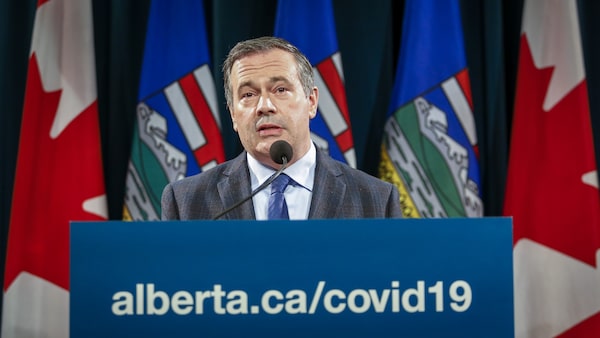
Equalization is at the best of times a complicated and polarizing question. It’s even harder to stomach such a vote right now; one that was promoted by the Albertan UCP party and their leader Jason Kenney.Jeff McIntosh/The Canadian Press
In politics, timing is everything. And, if you support Alberta’s “Fair Deal” initiatives, the timing for the province’s equalization referendum is close to a worst-case scenario.
The vote, which will be held on Oct. 18 in conjunction with municipal elections, was scheduled way back in the 2019 United Conservative Party platform. It was confirmed earlier this year, when vaccine optimism reigned and the province believed the worst of COVID-19 would be behind us by now. The UCP government thought Albertans would be focused on high oil and gas prices, or long-standing federal-provincial grievances.
But instead, the province is in the throes of a Delta-driven fourth wave – one many blame on the UCP’s premature push to remove health restrictions and COVID-19 measures this summer. Albertans are about to be subject to the surreal experience of voting on a question that seeks to end equalization – to unwind one of the key ties that binds Canada – at the same moment intensive-care unit staff from the Canadian Armed Forces, Newfoundland and Labrador, and the Red Cross are here to shore up the province’s overwhelmed hospitals.
Explainer: Everything you need to know about Alberta's referendum on equalization
Alberta’s battle on equalization has also become so intertwined with Premier Jason Kenney’s political persona that the question will be seen by some as an unofficial referendum on his leadership. Mr. Kenney’s pandemic-era polling numbers are approaching those of Donald Trump in Mexico (circa 2017). Supporters of the referendum are worried that provincial distaste for Mr. Kenney will taint the outcome by dampening enthusiasm even among those who would back the measure in more normal times.
The UCP is still putting up yard signs and handing out bumper stickers. But there haven’t been major public appeals from the Premier and his cabinet, as envisioned months ago. On Thursday, Mr. Kenney said his government is focused on the “task at hand,” meaning the COVID-19 emergency. But it’s doubtful anyone in favour of the vote would want him to be leading the parade, anyway.
The exact wording of the question is: “Should section 36(2) of the Constitution Act, 1982 – Parliament and the government of Canada’s commitment to the principle of making equalization payments – be removed from the constitution?”
Those who back the vote are trying to emphasize that the referendum question goes beyond one man.
“Vote Yes in the equalization referendum,” Alberta Proud, one of a handful third-party advertisers supporting the question, said on social-media platforms this week.
“A ‘No’ vote on the referendum will compromise the negotiating position of any Alberta Premier for a generation.”
Because the Alberta government has decided to put this issue to a vote – turning national attention toward the province – the stakes are high. Although the question explicitly asks whether equalization should exist, proponents of the referendum (including the Premier) argue that no one should take it that literally.
It’s not really about opening up a series of painful constitutional discussions about the existence of a program designed to make sure every Canadian gets roughly comparable public services, Mr. Kenney and others say. It’s about provincial leverage in negotiations with Ottawa. Have no doubt, the referendum is a high-priced, attention-grabbing political stunt.
But even if it’s gimmicky, Alberta could arguably use some leverage. The province is no longer an economic powerhouse that draws people and investment with ease. It has little representation within the governing federal Liberal ranks. Federal seat distributions aren’t equitable, and Alberta would have more MPs if the country’s electoral system more closely followed the principle of representation by population. Many Albertans feel that while other provinces and Ottawa have no trouble taking fossil fuel money, those other governments are detached from – and sometimes hostile to – the reality that Canada’s (highly regional) industry makes it one of the world’s biggest oil producers.
Bill Bewick, a political consultant who heads another “yes” group, Fairness Alberta, says anything but an affirmative vote is accepting the status quo in Alberta’s relationship with Ottawa. Ignoring resentments in Alberta could lead to greater national unity issues, he argues. That’s a sentiment I first heard from Mr. Bewick’s former boss, long-time Kenney rival Brian Jean, who in 2017 told me that such referendums are a necessary release valve for Alberta frustrations.
But these referendums can also reinforce political divisions. Many Albertans might believe the province has some power to remove equalization from the Constitution, and could be frustrated to find out it does not. Many other Canadians, including federal Conservatives from other parts of the country, find the fact the question is being asked in an economically troubled-but-still-rich province distasteful.
The question of equalization in Alberta is about much more than a single federal program. It’s an issue inextricably linked to the oil-rich province’s anxieties in a rapidly changing world of energy. In a debate about equalization hosted by a group called New West this week, University of Calgary economist Trevor Tombe noted that voting “yes” on this question means many different things to different people. “There’s not a lot of consistency about what Alberta even wants,” he said.
Albertans are facing fraught municipal elections where respected mayoral incumbents in both of the province’s largest cities are departing. The province is still weeks or months away from any easing of pandemic dread.
“Society goes on. The economy has to function. And our democracy has to continue to work,” Mr. Kenney said on Thursday. But equalization is at the best of times a complicated and polarizing question. It’s even harder to stomach such a vote right now.
Given the COVID-19 circumstances, and the related dislike of the Premier and the UCP government, the timing could be a major assist to those who want Alberta’s equalization referendum to go down in flames.
We have a weekly Western Canada newsletter written by our B.C. and Alberta bureau chiefs, providing a comprehensive package of the news you need to know about the region and its place in the issues facing Canada. Sign up today.
 Kelly Cryderman
Kelly Cryderman